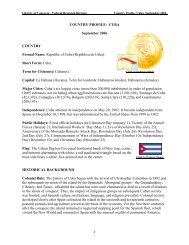1 - American Memory
1 - American Memory
1 - American Memory
You also want an ePaper? Increase the reach of your titles
YUMPU automatically turns print PDFs into web optimized ePapers that Google loves.
211<br />
housing a 5-month supply of paper on a year-round basis. As a pub-<br />
lisher of a weekly newspaper, I can attest to the fact that our printer<br />
makes every effort to maintain a 7 month's supply of our particular<br />
grade of newsprint and that we begin to push the panic button when<br />
delayed mill runs or shipping delays force us down to a 4-month in-<br />
ventory. At one point during the several strikes in 1971 and 1972 we<br />
were down to a 3-week inventory and faced with having to suspend<br />
publication.<br />
I personally conducted another survey in mid-September 1974 of<br />
the three largest automobile dealers in Honolulu. On the average these<br />
dealers maintain about a 60-day inventory of cars and trucks, approxi-<br />
mately double what their counterparts in California carry. When con-<br />
tracts are being renegotiated on the west coast, these dealers immedi-<br />
ately move to go to a 90-day or higher inventory. One auto and truck<br />
dealer who maintains a steady inventory of 500 units makes it a prac-<br />
tice to build his inventory to 1,000 units when the possibility of a<br />
strike looms. The cost of financing and storing such a huge inventory<br />
of high-priced merchandise is staggering. It costs $15 a month to hold<br />
an automobile in open field storage and at least $35 a month to finance<br />
that unsold vehicle. There is also an added insurance factor and an<br />
added cost of preparation because of extended exposure to weathering.<br />
These costs are passed on to the consumer, and, depending on the<br />
type of vehicle, means an increased purchase price of from $60 to $100<br />
because of extended inventory resulting from threatened shipping<br />
interruptions.<br />
Mr. Chairman, permit me to generalize from the standpoint of most<br />
small enterprises in Hawaii. They have had to adapt to the uncertain-<br />
ties of our isolated situation where there is no reasonable alternative<br />
to surface ocean shipping. The consumer fresh from the mainland is<br />
rather startled to be in a modern urban situation and to find so much<br />
merchandise to which he has become accustomed not available in<br />
Honolulu; and, further, to be almost constantly confronted by the<br />
response: "Sorry, we're out of that item now—come back in 2 or 3<br />
weeks." Even after 27 years in Hawaii I find this situation less than<br />
comforting. But the merchandisers in Hawaii are not careless and<br />
inefficient, they are only trying to avoid financial disaster. They try<br />
their best to keep a level flow of goods coming in but are fearful of<br />
having to bear the cost of more than a 3- or 4-month inventory. When<br />
demand for a particular item exceeds their advance estimates, it's easy<br />
to run out while replacement merchandise is still in transit.<br />
While a long list of commodities are in short supply or completely<br />
depleted during the 100-day west coast longshore strike in 1971, the<br />
most publicized shortage was toilet paper. Actually, there was enough<br />
inventory of this commodity at the start of the strike to last for 100<br />
days. But panic buying cleaned the shelves of the major retail outlets<br />
and, soon, other paper products began to disappear. Some people were<br />
using their homes as warehouses. Unhappily, people who did not<br />
hoard or were too poor to hoard were unable to find essential paper<br />
products for weeks. The same thing happened with salt, rice and other<br />
staples.<br />
The merchant is caught in the middle. "WTiile he and his wholesalers<br />
may have enough stock on hand to withstand up to 3 months of ship-



![Albert Einstein Papers [finding aid]. Library of Congress. [PDF ...](https://img.yumpu.com/21604228/1/190x245/albert-einstein-papers-finding-aid-library-of-congress-pdf-.jpg?quality=85)





![American Colony in Jerusalem Collection [finding aid]. Library of ...](https://img.yumpu.com/17941275/1/190x245/american-colony-in-jerusalem-collection-finding-aid-library-of-.jpg?quality=85)



![Piccard Family Papers [finding aid]. - American Memory - Library of ...](https://img.yumpu.com/17941234/1/190x245/piccard-family-papers-finding-aid-american-memory-library-of-.jpg?quality=85)


